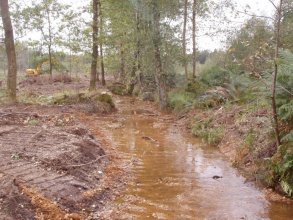Case study:Holmsley Inclosure Stream Restoration: Difference between revisions
No edit summary |
No edit summary |
||
| Line 7: | Line 7: | ||
{{Project overview | {{Project overview | ||
|Status=Complete | |Status=Complete | ||
|Themes=Environmental flows and water resources, Habitat and biodiversity | |Themes=Environmental flows and water resources, Habitat and biodiversity, Hydromorphology, Monitoring | ||
|Country=England | |Country=England | ||
|Main contact forename=Bryan | |Main contact forename=Bryan | ||
Revision as of 15:14, 27 February 2014
This case study is pending approval by a RiverWiki administrator.
Project overview
| Status | Complete |
|---|---|
| Project web site | |
| Themes | Environmental flows and water resources, Habitat and biodiversity, Hydromorphology, Monitoring |
| Country | England |
| Main contact forename | Bryan |
| Main contact surname | Boult |
| Main contact user ID | |
| Contact organisation | Hampshire County Council |
| Contact organisation web site | http://www.hants.gov.uk/ |
| Partner organisations | |
| Parent multi-site project | |
| This is a parent project encompassing the following projects |
No |
Project summary
This site is a part of New Forest LIFE project. Besides of the river bed restoration a 8.8 hectares of scrub management and vegetation clearance was made. Then a raising of bed levels for approximately 500m in the existing Stony Moors stream between the Inclosure boundary and the fords on the public road. Levels were raised to within 0.4m of the surrounding floodplain to restore winter flooding on the flood plain. This was achieved using clay plugs and backfilling with imported hoggin and available bank spoil. Due to the steep gradient additional support was given to the infill in the form of log weirs, oak boards and live willow.
Monitoring surveys and results
Lessons learnt
Image gallery
|
Catchment and subcatchmentSelect a catchment/subcatchment
Catchment
Subcatchment
Other case studies in this subcatchment: Avon Barriers Project, Avon Barriers Project: Ferengair Weir, HLS New Forest
Site
Project background
Cost for project phases
Reasons for river restoration
Measures
MonitoringHydromorphological quality elements
Biological quality elements
Physico-chemical quality elements
Any other monitoring, e.g. social, economic
Monitoring documents
Additional documents and videos
Additional links and referencesSupplementary InformationEdit Supplementary Information
| ||||||||||||||||||||||||||||||||||||||||||||||||||||||||||||||||||||||||||||||||||||||||||||||||||||||||||||||||||||||||||||||||||||||||||||||||||||||||||||||||||||||||||||||||||||||||||||||||||||||

